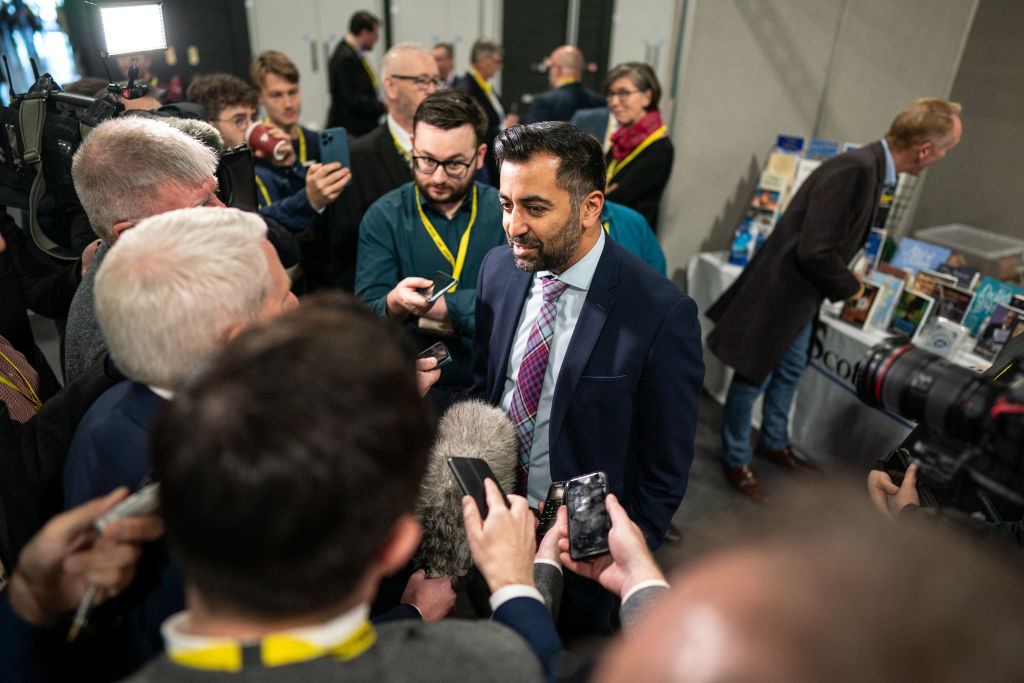SNP members really are the cheapest dates in UK politics — they’ll lap up any old swill dished out by their leaders. After the Yes campaign in the 2014 independence referendum was defeated, the nationalist faithful unquestioningly accepted repeated promises from Nicola Sturgeon that they’d soon have a second chance — and that, this time, they’d win.
The problem with the former Scottish First Minister’s position was that, for all her energising rhetoric, she didn’t have the authority to run another vote on the constitution. Sturgeon could, and frequently did, claim to be in possession of a mandate to deliver Indyref2 but she did not. Constitutional matters are reserved to Westminster and no amount of SNP anger can change that.
Laughably, after the vote was counted, Yousaf declared that when it came to the matter of another referendum the ‘process question’ had been answered. It had not.
By the end of her time in office, Sturgeon was starting to look desperate. First, she announced that a second referendum would take place on 19 October 2023 (Thursday of this week). Then, when the Supreme Court confirmed she had no power to hold this vote, she declared that the next general election would be a de facto referendum. This idea sent a shudder through the ranks of SNP elected members who envisioned their seats falling to opponents as the unionist majority voted tactically.
The de facto plan was riddled with problems. For one thing, it isn’t in the power of any politician to declare an election should be treated as a single-issue affair. And for another, even in their post referendum landslide of 2015, when the SNP won 56 of Scotland’s 59 Westminster seats, the party hadn’t secured more than half of the popular vote.
Sturgeon’s plan offered two outcomes — failure or different failure. If, by some miracle, the SNP could take more than half the vote, the UK government would, quite correctly, say this hadn’t been a referendum and if, as was more likely, the SNP came up short, the UK government would say: ‘You had your second referendum and you lost.’
On succeeding Sturgeon as SNP leader and First Minister six months ago, Humza Yousaf let it be known that he was not in favour of the de facto referendum plan. Who’d have guessed that he’d end up offering his members something worse? Yousaf proposed that, should the SNP win most seats at the next general election, he’d have a mandate to begin secession talks with the UK government. His party could lose swathes of Scotland and he’d still claim the right to break to break up the Union.
At the party’s conference in Aberdeen on Sunday, members supported the amendment of this plan. Now, Yousaf says that SNP victory in a majority of Scottish seats will be the trigger for talks with the prime minister of the day about ‘giving democratic expression’ to support for independence. Laughably, after the vote was counted, Yousaf declared that when it came to the matter of another referendum the ‘process question’ had been answered. It had not. The fact remains that the devolved government in Edinburgh hasn’t the authority to mess about with the constitution of the United Kingdom. Yousaf and his chums can have as many conference debates as they like about this issue as they like but meaningless promises won’t change the law.
For years, Sturgeon refused to be frank with SNP members about how difficult it would be to get another referendum off the ground. She continually told them that they were in ‘one more heave’ territory. Yousaf has chosen to continue down this path. SNP members leaving Aberdeen may believe that the result of the general election could open the door to independence, but it simply won’t.
If Yousaf’s party wins a majority of seats, he won’t have a mandate to open negotiations with the next Prime Minister who’ll be perfectly within his rights to tell the SNP leader to drop it. With a new independence strategy as nonsensical as the last, SNP members would do well to fast realise that they’re being led by a man who, like his predecessor, takes them for fools.







Comments